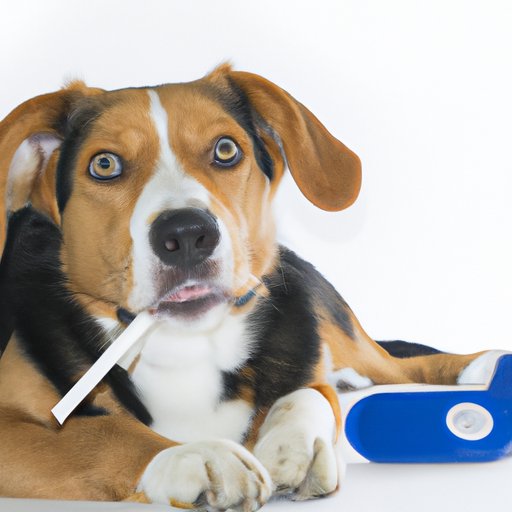How to Stop a Dog from Eating Poop
If you’re a dog owner, then you have probably come across the problem of coprophagia – that is, your dog eating poop. While it might seem like a gross and puzzling behavior, it’s not uncommon. According to a survey, nearly one in four dogs has been reported to indulge in poop-eating at some point in their life. But, you don’t have to live with your dog’s poop-eating behavior. In this article, we’ll explore several strategies to help you stop your furry friend from indulging in this unsavory habit.
Understanding the Reasons behind Coprophagia
The first step in solving a problem is to understand its underlying cause. The same is true when it comes to coprophagia in dogs. A few different factors can contribute to the behavior, including nutritional deficiencies, medical conditions, or behavioral issues. For instance, if your dog is not getting adequate nutrients from their diet, they may start eating poop. Similarly, medical conditions like Cushing’s disease or parasites could lead to coprophagia. In some cases, anxiety or boredom could be triggers for this behavior.
As a caring dog owner, it’s essential to identify the underlying cause to stop the behavior effectively. One good start is by observing your dog’s behavior and poop-eating patterns. Are they eating poop when they are alone or only in the presence of other dogs? This might provide you with clues as to the underlying issue causing the behavior.
Adding Supplements to Your Dog’s Diet
Adding food supplements or specific foods to your dog’s diet can help prevent coprophagia from occurring. For example, supplementing your dog’s diet with digestive enzymes, probiotics or other supplements can often rectify nutritional deficits that may be prompting the behavior. Similarly, providing dogs with high-fiber diets can make their poop less palatable, therefore less tempting to eat.
It’s crucial to speak to your veterinarian before you make any significant dietary changes or supplements. They can advise you on the best course of action for your dog’s particular nutritional needs and overall health.
Training Dogs to Drop It
Training your dog is another effective way to stop them from eating poop. The first step is teaching your dog basic commands like “drop it” or “leave it.” You can use treats, toys, or praise to encourage your dog to obey these commands consistently. With practice, your dog will understand the commands and respond accordingly, making it much easier for you to prevent them from eating poop.
In addition to basic commands, there are many training techniques available. For example, clicker training often works well in curbing coprophagia. Clicker training can reinforce the positive behavior to address the negative behavior. If your dog refrains from eating poop, you can click the button and offer praise or treats for the desired behavior.
Cleaning Up Immediately
If your dog craves poop, the best method to keep them away from it is to clean up poop promptly. Make sure you’re always prepared to handle the situation by carrying poop bags on hand. The quicker you clean up after your dog, the less chance they will develop an interest in their poop or that of other dogs. This trick also helps to maintain a clean and healthy environment for you and your loyal friend.
Another way of ensuring your dog does not eat poop is by supervising them while they are out for potty breaks and walks. When you’re outside with your dog, keep them on a leash and keep a close eye on what they are doing. Also, as a dog owner, it’s essential to poop-scoop your dog’s area regularly to reduce the possibility of repeated poop-eating behavior.
Using Aversion Therapy
Aversion therapy involves using a technique to discourage behavior from happening. One aversion technique applicable to coprophagia is applying bitter-tasting substances to poop. This aversion technique works because dogs hate the taste and will be discouraged from eating poop. However, the downside of aversion techniques is that they can result in aggression, fear, or anxiety if not used correctly. Therefore, it’s vital to practice aversion techniques cautiously and in combination with positive reinforcement.
Redirecting Behavior & Providing Stimulating Toys
If your dog’s coprophagia behavior is from boredom or anxiety, giving them stimulating toys and activities can redirect this behavior. There are lots of toys specifically created to satisfy a dog’s curiosity and reduce restlessness – treat-dispensing toys or puzzle feeders are excellent examples. Similarly, encouraging physical activities like playtime or taking long walks can help reduce anxious or bored behavior.
Another way of improving behavior is spending more interactive time with your dog. Develop fun and engaging games or new techniques that can get you and your dog active; this helps alleviate your dog’s boredom and anxiety.
Conclusion
Coprophagia may seem like a daunting problem. But, remember to approach it patiently, understanding that each dog is different and may require different strategies. A mix of the tactics mentioned above, including adequate training, cleaning up promptly and providing stimulating toys are vital to curbing the behavior effectively. Also, it’s important to consider consulting your veterinarian for advice specific to your dog’s needs. With a little patience and persistence, your loyal friend can become healthier, happier, and no longer interested in poop.
